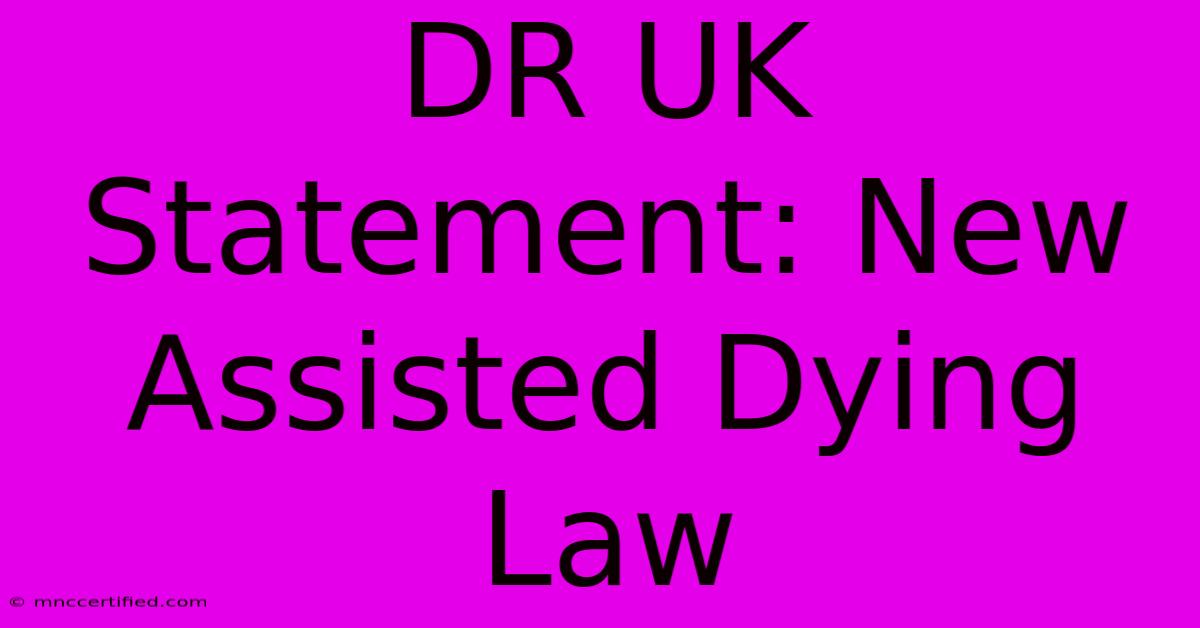DR UK Statement: New Assisted Dying Law

Table of Contents
DR UK Statement: New Assisted Dying Law – A Comprehensive Overview
The recent announcement regarding a new assisted dying law in the UK has sparked significant debate and necessitates a thorough understanding of its implications. This article will dissect the Disability Rights UK (DR UK) statement on the matter, exploring the key concerns, potential impacts, and the broader ethical and societal considerations.
DR UK's Position: Concerns and Criticisms
DR UK, a prominent voice for disabled people's rights, has expressed serious reservations about the proposed assisted dying law. Their statement highlights several crucial concerns, primarily focusing on the potential for coercion and discrimination against vulnerable individuals, including those with disabilities.
Vulnerability and Coercion: A Central Worry
One of DR UK's main arguments centers on the vulnerability of disabled people within a system allowing assisted dying. They argue that societal prejudices and pressures, coupled with limited access to adequate healthcare and support, could lead to disabled individuals feeling pressured to choose assisted dying, not because they genuinely wish to die, but because they feel they are a burden on society or their families. This is a critical concern, as it undermines the principle of autonomy and informed consent, central to any ethical framework surrounding end-of-life choices.
The Risk of Discriminatory Application
DR UK's statement also points to the potential for discriminatory application of the law. They fear that disabled people, already facing societal stigma and barriers to accessing quality healthcare, might be disproportionately affected. The assessment process, they argue, could inadvertently prioritize the lives of those deemed "worthy" of continued existence, leaving those with disabilities feeling marginalized and undervalued. This raises serious questions about equity and equal access to healthcare, not just end-of-life options.
Inadequate Safeguards and Support Systems
DR UK emphasizes the need for robust safeguards and comprehensive support systems before any assisted dying legislation is implemented. The current provisions, according to their statement, are inadequate to protect vulnerable individuals from coercion or discrimination. More investment in palliative care, accessible healthcare, and social support services is crucial to ensure that people are not driven to assisted dying due to a lack of other options. This requires a proactive approach to addressing societal attitudes towards disability and improving the overall quality of life for disabled people.
The Broader Ethical Debate: Beyond DR UK's Statement
The debate surrounding assisted dying extends far beyond DR UK's concerns. It involves intricate ethical questions regarding autonomy, sanctity of life, and the role of the state in determining the value of individual lives.
Autonomy versus Protection: A Balancing Act
The central tension lies between respecting individual autonomy – the right to make choices about one's own life and death – and protecting vulnerable individuals from coercion or exploitation. Finding the right balance between these two crucial principles remains a significant challenge.
The Slippery Slope Argument
Opponents often express concern about a "slippery slope," arguing that once assisted dying is legalized, the criteria for eligibility might gradually expand, potentially leading to unintended consequences and abuses. This is a complex argument, requiring careful consideration of potential safeguards and robust regulatory frameworks.
Conclusion: The Path Forward
The new assisted dying law in the UK necessitates careful monitoring and ongoing evaluation. DR UK's statement serves as a vital reminder of the potential risks and challenges associated with such legislation. Addressing the concerns raised by DR UK and other disability rights organizations is crucial to ensuring that any assisted dying framework is both ethical and equitable, protecting the vulnerable while respecting individual autonomy. Further research and public discourse are needed to refine the law and safeguard against unintended consequences. The focus must remain on providing comprehensive support and improving the quality of life for all individuals, especially those with disabilities. A robust system of checks and balances is essential to ensure that assisted dying is a truly informed choice, free from coercion and discrimination.

Thank you for visiting our website wich cover about DR UK Statement: New Assisted Dying Law. We hope the information provided has been useful to you. Feel free to contact us if you have any questions or need further assistance. See you next time and dont miss to bookmark.
Featured Posts
-
Uk Transport Secretary Resignation
Nov 30, 2024
-
College Football Rivalry Week Clinches
Nov 30, 2024
-
Barry Bonds Sf Giants Jersey
Nov 30, 2024
-
Assisted Dying Bill Clears First Hurdle
Nov 30, 2024
-
Sephora Black Friday Sale Bestsellers 50 Off
Nov 30, 2024